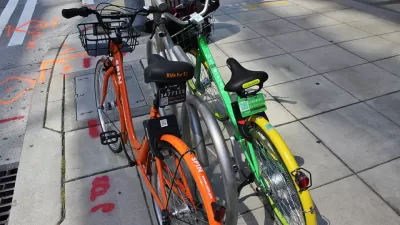After missing out on the latest round of TIGER grants and being stuck in acquisition limbo with the city of Seattle, the bikeshare system of Pronto is running out of money and time.
Josh Cohen delivers dark news for Seattle's bikeshare program, Pronto:
Seattle’s bike-share system is in dire straits. After a little over a year of operations, Pronto turned to the Seattle City Council for a $1.4 million bailout. Without it, the system will be insolvent by the end of March and the city might be required to pay back more than $1 million in federal grants.
Nicole Freedman, the director of active transportation for the Seattle Department of Transportation (SDOT), recently attended a City Council committee meeting recently to ask for the release of "$1.4 million of the $5 million in the 2016 city budget allotted for bike-share expansion." That expansion, billed in October as a significant public investment in the Pronto system, was delayed, "pending a fleshed-out plan for the expansion," according to Cohen. Pronto also failed to win a $10 million TIGER grant that would have contributed to the expansion.
The requested $1.4 million would help SDOT to take ownership of Pronto. Some councilmembers are concerned about the city taking over ownership of what is clearly a troubled operation.
In an earlier story, Evan Bush detailed the debate about how Pronto got into this position. While some say the bikeshare program failed to raise sufficient funds before launching, Pronto officials respond that the city's delayed acquisition process is responsible for the current state of the system's finances.
FULL STORY: Seattle’s Pronto bike-share nonprofit teetering, seeks $1.4M rescue by city

Planetizen Federal Action Tracker
A weekly monitor of how Trump’s orders and actions are impacting planners and planning in America.

San Francisco's School District Spent $105M To Build Affordable Housing for Teachers — And That's Just the Beginning
SFUSD joins a growing list of school districts using their land holdings to address housing affordability challenges faced by their own employees.

The Tiny, Adorable $7,000 Car Turning Japan Onto EVs
The single seat Mibot charges from a regular plug as quickly as an iPad, and is about half the price of an average EV.

Seattle's Plan for Adopting Driverless Cars
Equity, safety, accessibility and affordability are front of mind as the city prepares for robotaxis and other autonomous vehicles.

As Trump Phases Out FEMA, Is It Time to Flee the Floodplains?
With less federal funding available for disaster relief efforts, the need to relocate at-risk communities is more urgent than ever.

With Protected Lanes, 460% More People Commute by Bike
For those needing more ammo, more data proving what we already knew is here.
Urban Design for Planners 1: Software Tools
This six-course series explores essential urban design concepts using open source software and equips planners with the tools they need to participate fully in the urban design process.
Planning for Universal Design
Learn the tools for implementing Universal Design in planning regulations.
Smith Gee Studio
City of Charlotte
City of Camden Redevelopment Agency
City of Astoria
Transportation Research & Education Center (TREC) at Portland State University
US High Speed Rail Association
City of Camden Redevelopment Agency
Municipality of Princeton (NJ)



























